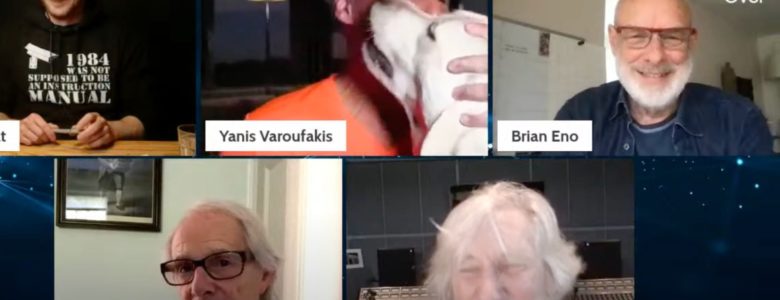
What political lessons can we learn from football? A lively chat with Yanis Varoufakis, Brian Eno, Roger Waters and Ken Loach
On the 6th edition of Let’s Talk It Over, chaired by Frank Barat, Yanis Varoufakis, Brian Eno, Roger Waters and Ken Loach, talked about lessons progressives must/can learn from…football.
It turned out a fun, and possibly, insightful, hour. Whatever the quality of our musings, there were also two funny moments:
When Ken Loach was stood on his head, reminding us lefties of what Marx did to Hegel:
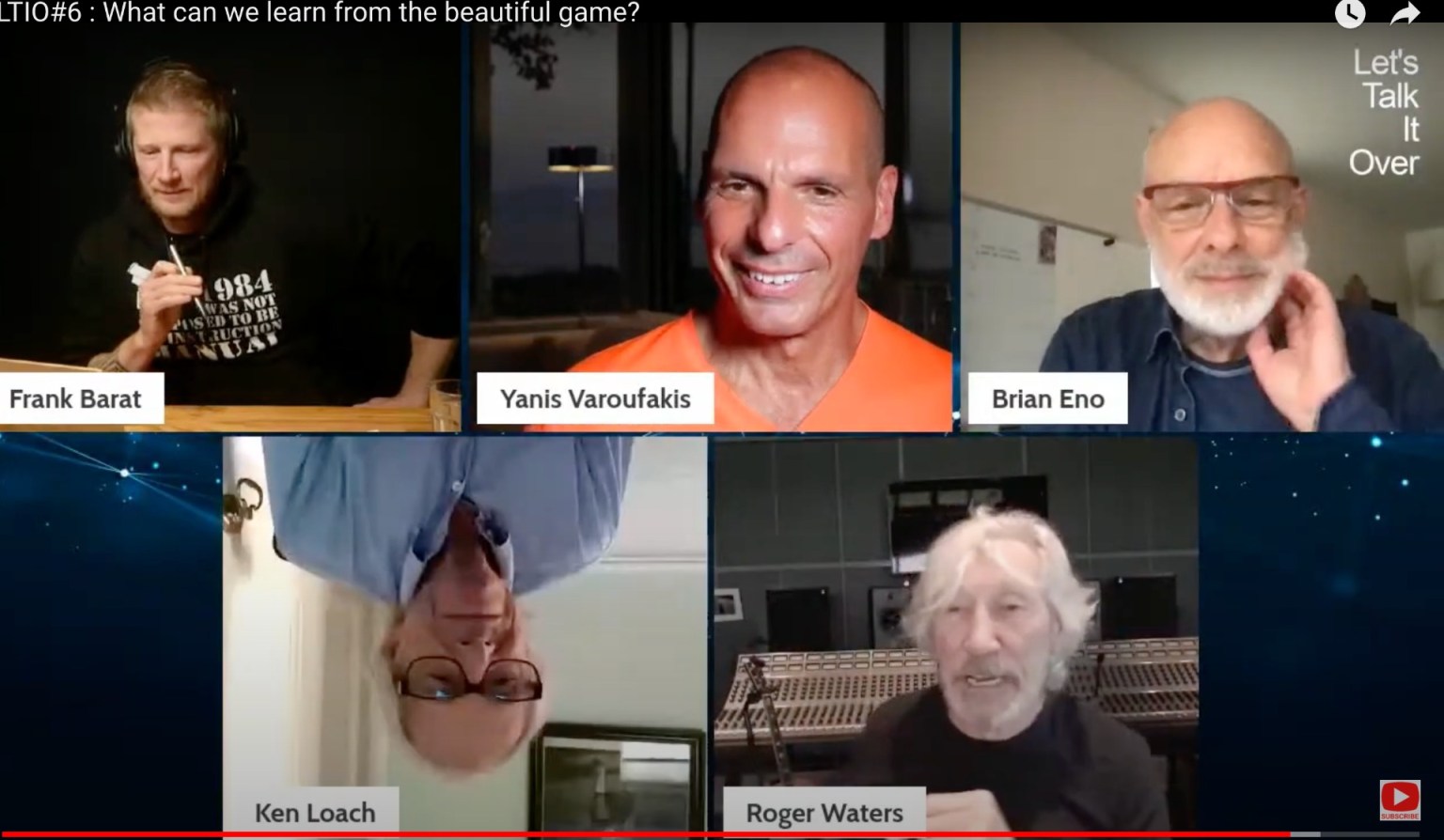
And when Mowgli decided I had said enough and it was time to take him to the beach:

After our chat was over, I felt sufficiently inspired after our chat to put down some of the thoughts I had tried to express. For what they are worth, here they are:
Contemporary societies, comprising atomised persons, deny men and women the experience of solidarity. Importantly, football is the last bastion of solidarity. It actually provides solidarity in oodles, sometimes to the point of shared frenzy.
And, yes, it is the beautiful game. Football’s beauty at times reaches the heights of an art that can take your breath away.
Moreover, football offers excitement, a simulation of bloody war, or at least skirmishes that would otherwise cause the police to step in. It provides people with an opportunity to experience tribal rituals and, at once, community festivals. It even brings on moments of ancient Greek tragedy – in the form of the penalty shootouts English fans know so well.
And then there is the special relationship between fans and players – a unique relationship that ordinary people cannot have with Hollywood stars or outsized basketball players: footballers look and sound very much like them. And that’s why they celebrate them: as their alter egos.
Football is also a little like Greek or Catholic Easter: It is uniquely able to bring under the same roof fascists and the leftists they seek to exterminate. On the terraces, we find neofascist white supremacists and Marxist trades unionists. On the pitch, sophisticated leftists like Socrates and Cantona and Tory icons like David Beckham.
Time for a personal story: I was ten. It was 1971. Panathinaikos was playing Red Star Belgrade in Athens in the European Championships semifinals – which they won, earning a place in the final, at Wembley versus Ajax. Those were bleak days in the midst of the fascist dictatorship (1967-1974). Our fascist rulers were in the stadium, cheering. I remember watching the match in television with my mother, both of us cheering the Greek team’s victory despite knowing full well that at a stone’s throw distance from the stadium there was a torture chamber (run by ESA, the feared military police) were democrats were being tortured and maimed, including my mum’s brother. I mention this story as the best example I can think of the paradox that is football.
Football is too complicated politically to portray in black and white terms. Yes, football affords the working class the illusion that their rituals are better than the bourgeoisie’s. But, beware: this is NOT a revolutionary feeling, but one that makes exploited workers more willing, even enthusiastic, to endure their exploitation – it makes them more reluctant to become agents of change.
Even worse, football is a breeding ground for outraged populism – recall the recent revolt against corporate bastards who tried to take over the beautiful game with their plans for a Superleague. The same fans who celebrate when a rich bastard buys their club and promises to spend millions to buy star players!
Yes, football is the opium of the people. But, like the most effective mind-altering drugs, football offers humans invaluable comfort in the midst of a cruel social order – and it captures much that is human. Because I agree with Karl Marx who once said that ‘Nothing human is alien to me”, I feel I have no right to be a stranger to football.
So, with this excuse, let me declare my undying commitment to Panionios, my struggling Greek team founded by refugees who arrived here in 1922. And let me finish with a “Come on you Reds”, meaning both socialists and Liverpool, an association whose credibility we owe to that great socialist Bill Shankly.
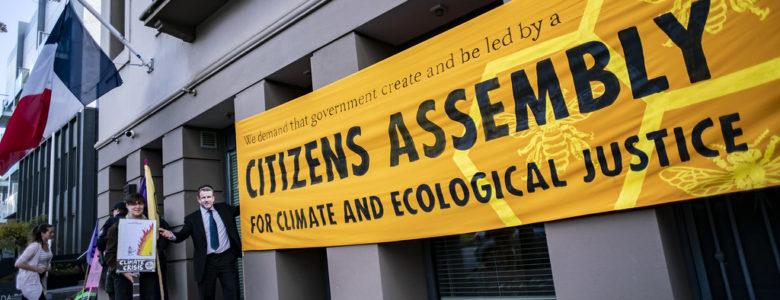
Informed opinion carves a new democratic path for Bristol
DiEM25’s Deliberative Democracy group (DD DSC) came into existence to increase our members’ literacy about a whole range of tools which cherish this aspect of democracy at a time when it is particularly under attack from far-right techniques of polarisation between Us and Them.
Ever since the motion on Citizens’ Assemblies for Democracy in Europe was passed at our Prague Assembly in 2019, we have been building relationships with talented organisations and experts involved in this field. More recently the DD DSC has taken a particular interest in the potential impact of these decision-making ‘mini-publics’ on the democracy of towns, cities and local authorities. O
ne good example is the citizens assembly held in Bristol in January 2020 around a core theme for all of us, worldwide: “How do we recover from COVID-19 and create a better future for all in Bristol?” In June, Rosemary Bechler interviewed the organiser, Councillor Paula O’Rourke. If this interests you, please join us in the Deliberative Democracy DSC and help us spread the word!
Paula O’Rourke is leader of the 24 Green councillors on Bristol Council. Elected as a Green councillor for Clifton in 2016 at the age of 58, this was her second career. Formerly, Paula worked in leadership in secondary schools and taught English, history, law and citizenship. She was the first chair of the Friends of Clifton Centre and Library and ran the Friday Film Club. She also worked on the first ever local LitFest in November 2019, running the annual Shakesbeer Promenade, an on-street Shakespeare festival.
Rosemary Bechler: Congratulations, first of all, on becoming the leader of 24 Green councillors on Bristol council.
Paula O’Rourke: Yes, it’s going to make quite a difference: we’ve gone from 11 councillors in a council with a resounding Labour majority for the last five years. I’m glad to have been appointed leader. Bristol has a Labour Party elected mayor who has executive power, so we haven’t been offered any cabinet positions, despite being joint largest party. But we do have some extra committee roles and we’ll see.
RB: Do you think your electoral bounce will damage the rather good relations you had with Labour councillors – leading to your citizens’ assembly, for example?
P.O’R: I hope not. The Bristol Citizens’ Assembly was a cross-party initiative. It was my Green motion that was put before council in January 2020, but the Cabinet member for communities, the Labour assistant mayor Asher Craig, came on board very quickly. If she hadn’t reached across and facilitated it, it wouldn’t have happened. That in itself was a sign of good things to come.
RB: Greens have done pretty well in elections throughout Europe. What do you think prompted this result in Bristol?
P.O’R: There were two reasons. The climate emergency is much more at the forefront of people’s minds. But also, it was the pandemic. A lot of our policies which seemed a bit risible before the outbreak – universal basic income; the four-day week; having health and happiness as a measure of success and not just GDP – after the spell at home and in isolation, looking at the world through a slightly different prism, people have had both the time and space to engage with some of our ideas and think that they are meaningful and sensible.
We think that the people of Bristol voted for us because they wanted to have Green voices on the council, involved in policy and decision-making.
RB: Has local politics acquired a different meaning in the pandemic?
P. O’R: The mayor and the administration did a good job during the pandemic and showed very good leadership in Bristol. Coming up to the election though, there was a lot more debate about the unreasonable powers that the Mayor has. Opposition began to emerge to his being ‘too autocratic’. This raises democratic issues of course. If the Mayor doesn’t have to listen to you, and there have been a few occasions in recent Bristol history where people felt that he didn’t engage with their concerns, then they wonder if they have a voice.
This takes us back to why I initiated the citizens’ assembly project. I felt that people were disengaged. We were doing consultations, but not giving people the right amount of information, and so they felt that they weren’t able to make good decisions and that decisions were being imposed upon them. That, at least, couldn’t happen with a citizens’ assembly and its recommendations.
My conviction was that in order for democracy to work you have to have two things: you have to have an informed demos and a reliable press. I don’t think we have either in England. I thought, well I can’t do much about the latter, but a citizens’ assembly could maybe address the former. And indeed it has proved so powerful – that involvement.
RB: What introduced you to citizens’ assemblies in the first place?
P.O’R: I am Irish, so I know about the effectiveness of citizens assemblies and the change that they have wrought on people’s thinking in Ireland – which has just been astounding.
Take my mother in law, who is 90 years old. Here is a daily communicant, 100% Catholic, and I happened to be over there in the middle of the abortion referendum and was determined not even to ask, since I knew exactly what she was going to say. She would follow the edict of the church. However, the conversation came up. I was forced to say, “Well, Mary, how are you going to vote in the referendum?” And she replied, “ Oh, I’m voting FOR of course. I mean after all, it’s a woman’s right to choose!”
I couldn’t believe it! She had been able to change her mind because there had been nuns and all sorts of people participating in the citizens’ assembly on abortion rights who she was able to identify with. She trusted some of the people involved. In Ireland they talked about it incessantly and cascaded some of the sessions down in audio files and online.
After the 2016 debacle over Brexit, it was quite obvious that what is missing in a referendum like that is ‘informed opinion’. It was that phrase that I hung my project around, because I really do believe that if you give people all of the information they will be able to make good decisions.
We had had a consultation process going about new roads in Bristol not long before. There were eight options, and a consultation document was shared with citizens. But there was no information about the costs of them, so how could you compare under circumstances in which if you chose road 8 it was four times more expensive than the others and unlikely to be finished because of the high costs?
I thought that was pretty useless really, and I did quite a lot of research, not only into citizens assemblies but into other types of deliberative practices. In the end, my motion suggested two pilot programmes: one was a citizens’ assembly, and the other was a participatory budget. Both of them are all about the engagement of people.
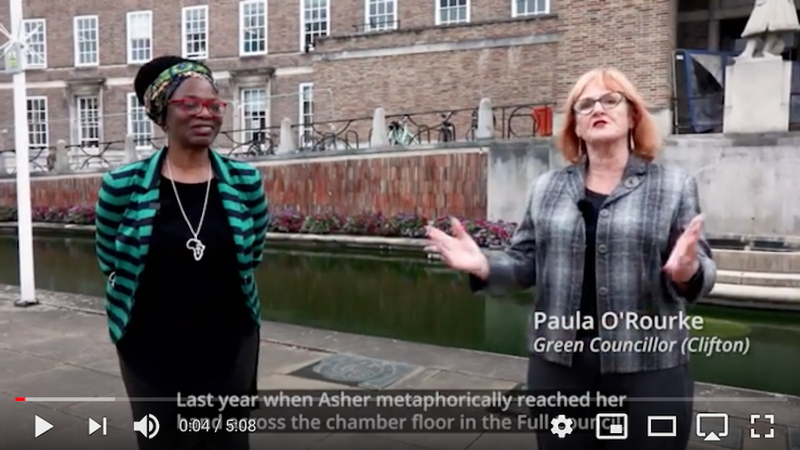
RB: When did you start?
P.O’R: We passed the motion in January and some money was found for it, and then of course the pandemic started in March. I thought all momentum would be lost. But it wasn’t, and again I have to give credit to Asher Craig for this because as the cabinet member she was the one who really decided it.
We speculated that we might have our citizens’ assembly around climate change and meeting our 2030 carbon-neutral target, but then it seemed more important to shape it around ‘build back better’, ‘how to recover’, and the ‘new normal’ – all those phrases which were at the forefront of our minds last year. The real challenge immediately became very obvious then.
I was really worried that we would spend all this resource on doing a citizens’ assembly that would come out with some woolly, amorphous, meaningless macro-suggestions that couldn’t be measurable. We really needed to ensure that we came up with something meaningful, without being too didactic. It took a long time to decide how to do it.
RB: The participants didn’t choose the agenda for this assembly did they?
P.O’R: What we did was a detailed survey of people in Bristol with around 40 questions in it about the city – how people travelled around it, support groups, people working – and for some reason this really captured people’s imaginations. We had about seven times the number of responses we would usually expect, around 8,000 responses. That meant we could find some areas of disagreement among all the things people agreed on, and we chose those more controversial topics to go into the citizens’ assembly.
In the end we refined it down to housing – 40% of our carbon emissions come from powering and warming our houses so we thought that would be a good place to start. A second question was about active travel and liveable neighbourhoods and the third was about equality and health.
RB: How did you choose your 60 participants?
P.O’R: We used sortition and sent out twelve thousand letters with invites. It was oversubscribed and interestingly, the types of people who most oversubscribed were the disabled and the black and minority ethnic communities – the hardest to reach. That was moving.
We used seven criteria overall for representing the demographic spread. Obviously there was sex, age and ethnicity, but also geography, disability, deprivation and employment. Age was revealing because 20% of the citizens of Bristol are under 24 and so 20% of the citizens assembly were young people, who changed the whole timbre of the meeting. Their presence was so dignified!
We also offered a stipend of £300 for attending the assembly on four weekends. That made a big difference to people who needed childcare or were working on a zero-hours contract or whatever.
It made another difference as well: people thought, “Well this is serious. if you are going to pay me – you are actually going to listen to what I am saying.”
We had a huge discussion about range versus depth. If you put one hundred people in a room, would you get the depth of analysis we needed? In the end we decided on sixty people throughout. On the first weekend, the sixty would come together, but in the next two weekends, they would break down into workshops of twenty each, still stratified in those seven categories.
Then they could roll out their recommendations in more depth, come up with more questions, get to know each other better and maybe build up more confidence and be more secure about their knowledge on those issues. The last weekend, they would come back together again and vote on all of their recommendations.
I went into this hoping that if you devolved some real power and dignity to people they would rise to the occasion and they certainly did. Nobody was ever late, nobody missed anything. All sixty citizens turned up to everything. It was amazing.
RB: You kept a record of all their voting results, so that people can see if there was significant support for a counter-proposal and so forth. It’s beautifully laid out on your website.
P.O’R: Yes, all the percentages are in the report. I was a remote observer, and so you could see all these digital sticky notes being moved around while people discussed which recommendations might be combined and so forth. The level of the debate seemed to be extremely intelligent and informed.
RB: You weren’t able to attend?
P.O’R: We felt it was important that people weren’t overlooked and it was the right decision. I was able to observe the expert presentations and the plenaries, but the actual workshops didn’t need that further inhibiting factor.
We did a survey of the participants afterwards and the satisfaction levels were very high on the whole event. Nobody said that they felt that they hadn’t been listened to. The results about how they found being engaged with local democracy were off the scale! “I’m more likely to vote”, “more likely to stand for council”, “more likely to do everything!” Thirty-six of them have said they want to stay in contact. These results were very encouraging and we are going to do it again.
RB: You put together an advisory group to recommend suitable speakers and make sure the debate was fair and balanced. You describe them as having “a breadth of knowledge across the discussion topic areas and a wider understanding of issues facing the diversity of people in Bristol.” How did you choose them?
P.O’R: Having decided our topics we then had to decide how to enable the citizens to come to their decisions: we had to give them expert advisers or people with lived experiences of these issues. At that point, we decided to set up an advisory panel. When the first panel was put together, myself and Asher were on the steering group and were brought the list. We both had the same reaction, which was: “This is just same old, same old. The great and the good. How do these people get to be on the panel? No. We want XR, some of the black and green ambassadors, the young people, people from all sorts of different organisations.” You’ll see the final list on the website: the expert panel is listed there.
The panel made all the difference because the minute they were all in the room, they were saying, “No, you really need to hear from this person”, and “I can put you in touch with this young man who can really tell you what it’s like ‘growing up poor’” – or whatever we thought the issue was. I was nervous about that element of it, because a citizens’ assembly is so much about ‘informed opinion’, if you don’t put the right experts in front of people, it is dangerous.
I think we did get that right. One of the presenters was a council official who I know well from my scrutiny commissions. I noticed that when he was presenting to the citizens, with great emotional intelligence, he changed his style and was very warm and encouraging, whereas with me as a council member, he is more formal and distant – and he seemed to pitch it exactly right so that he could then go into break-out rooms and talk to people and guide them in their conversations, making sure that they were asking the right sort of questions to get at what interested them.
RB: You were reporting your assembly recommendations to two different bodies, the One City Economy Board, ‘to help inform the city’s recovery strategy’, and Bristol City Council’s cabinet, ‘as a key input in shaping future strategy and actions’? What is the first body ?
P.O’R: In June the report is going to the Cabinet and then it will go to the full council. The recommendations will meanwhile be mapped onto all Bristol Council’s boards – the economy board, the environment board, the transport board. What I am hoping is that in all our strategy documents, the recommendations of the citizens’ assembly will have its own colour, so that those recommendations can be tracked in all its stages and we will have a six-month, annual and eighteen-month update to give back to the citizens.
The One City Board comprises business interests, the university, the NHS, all those partner organisations the Mayor needs to drive through progress in Bristol.
One of the assembly’s recommendations, for example, gives those bodies a very clear mandate: “By 2030, 80% of all journeys in Bristol should be by public transport or by active travel. Take 5% of cars off the road every year, and take 5% of parking away for more cycle parking, lanes and walking.”
I feel that I now have a personal mandate from this. But so does our elected mayor. He has said that he accepts all the recommendations. So now it is a question of making sure that they are pushed though. Of course it is difficult. This was our first ever citizens’ assembly and we wanted to embed these processes. I didn’t want to tie us into something less than satisfactory.
So we had the choice: the recommendations could be binding or they could be advisory. We ended up somewhere close to binding, because there was an assumption that they would be accepted. But it was advisory. The report is coming recommended to cabinet. To all intents and purposes, though, we’re on board.
RB: So what is your overall assessment of the whole process?
P.O’R: I grew up in the sectarianism of the conflict in Ireland and there again, it is putting people in a room and letting them understand other people’s experiences that is the first step to change.
I think that happened to some extent as well in our citizens’ assembly. I only saw them on zoom, but you could see elderly people who sounded as if they had been privately educated talking to very young black and Asian Muslims who were all listening to people’s stories. And from the plenaries you could tell that some sort of unifying experience had taken place. It felt really good.
RB: I’d like to read you a quote from Graham Smith – a UK expert in these democratic processes, who I have interviewed for openDemocracy. He said:
“We have a real tension here between digital and deliberative democracy, if I can use that shorthand. I think the digital people are obsessed by numbers, and the funny thing is that this can very easily end up as an old politics – who is shouting the loudest? How many people are ‘liking’? That reminds me of standard electoral politics. Proponents of this approach come to you saying, “Look how many people have engaged with this!” Maybe it is a matter of political taste.
The point about citizens assemblies is that it is not a large group, but it is diverse. And you cannot be sure about that with online ‘likes’. Online engagement will almost certainly not have the diverse characteristics of the broader population, whereas selection by sortition in citizens’ assemblies builds this into the process. … Secondly, should we make our decision by responding to people’s views as they hold them now, given that their normal everyday interaction is with people like themselves, under conditions in which they may not have engaged much, if at all, with a range of other views? Or should we create a democratic space in which people work these issues through with people who are different from them and who hold views that are different from theirs?”
P.O’R: I agree. Those digital spaces like Twitter are so often just echo chambers for people who are like-minded or who hate each other – a complete waste of time! Moreover it skews people’s actions if you think people are going to be commenting all the time. Just go ahead, I say, and do what you believe is the right thing to do.
RB: How influential do you think your assembly was in terms of the public debate in Bristol? For example, would it have impacted on the local election campaigning?
P.O’R: It’s a bit frustrating. I know you can get coverage in no time if there is a huge spat at Council. When I contacted local journalists or broadcasters on this, I would be saying, “Look, just read the recommendations. It’s amazing what they were doing.” But I would get the reply, “People aren’t really interested at the moment: they’re just interested in COVID.”
“It’s recovery from COVID that they were talking about,” I’d say, “That’s what it is!” – but they just haven’t followed it up at all.
I’m still hoping that when the recommendations are reported to cabinet, they will do.
But the problem with deliberative democracy more generally is that the vocabulary is unfamiliar to people, so that when you start talking about sortition or citizens assemblies, people just don’t know what you are talking about.
RB: I totally agree and I find that terrifying because I have been sitting here for four years watching the systematic dismantling of this core element of our parliamentary democracy: Johnson trying to prorogue parliament rather than have a debate, criticising the supreme court for having the powers to prevent this, ending parliamentary scrutiny. I often wonder if anyone else sees what is going on?
P.O’R: They definitely used the pandemic to bypass a lot of parliamentary decision-making. Also of course, we are hugely damaged by our first-past-the-post electoral system. The price this country has paid to enable those two parties to stay in one piece is enormous, not least coming out of Europe for one of them.
How can you engage people in democracy if they realise that the person they want to vote for they can’t vote for and that you are voting for the least bad person; or if they know that 24-30% of the population can get some party in with a majority in parliament?
I used to teach citizenship in schools, and when you taught kids about forms of democracy – theocracies, autocracies, democracies and direct and participative and representative democracies – they were really fascinated. Yet it is a vocabulary that grown ups don’t know anything about! It’s taught to them in one or two lessons. They love it in that moment, but then they forget all about it. They are not eligible to vote, so they are not interested at all, and then they go off into the world. It needs to be taught as a much larger part of the curriculum – and we need to capture that initial fascination.
From watching the plenaries in our Bristol citizens’ assembly – and this is purely anecdotal, there is no measurement of it – just watching the older participants who probably always have felt entitled to have their own opinions, and have a knowledge and understanding of issues, they were nevertheless listening to these young people with amazement in their eyes because they were being so cogent, articulate and offering such reasoned opinions.
There was a real bonding between these people who never would have met each other. And there was definitely a recognition that people did change their standpoints or moderate their views. People would say, “Well I have a car and maybe I don’t like this and that … but maybe the younger generation and other people need that and the other…”. A lot of people undervalue youth and think that you can’t ask a 16-year-old to make decisions. It’s terrible. We should reduce the voting age to sixteen. The whole thing was very enjoyable, and certainly the most uplifting thing I have done politically.
RB: So what’s next, Paula?
P.O’R: We have got three years now to make a difference and I have got loads of ideas. We are going to do another citizens’ assembly next year. The fact that we have 24 councillors is fantastic for these citizens’ assemblies, because we have both the energy and the urgency to implement change as rapidly as possible.
The Green Party is very bottom-up. We are not whipped: everything is by consensus. So we have that sort of ideology anyway. And hopefully if I have my way, we will also be organising participatory budgeting. Asher and I were talking about that just today. In Scotland, they do this really well. They have X-Factor-type competitions for people to come in and bid for the money and people are hugely engaged in this. It’s for everybody.
I don’t think that representative democracy should be replaced. But I think citizens’ assemblies can be used much more at both the regional or national levels.
First and foremost I have learned that I would trust citizens. If they have all the information, they will address the range of concerns and take it all very seriously.
I’m really pleased that more than 50% of the participants in the assembly want to stay involved, and of the seven and a half thousand who filled in the survey over two thousand wanted to be in the citizens’ assembly, and there were loads of people coming to me and saying, “Can I be in the citizens’ assembly?” I had to explain that it didn’t work like that.
But that’s not a bad thing too: it did make the citizens who were chosen feel quite special and privileged to have the opportunity. As I said, nobody was a minute late. 10am and on your marks – everyone was there and paying lots of attention. It was extraordinary.
Rosemary Bechler is a member of DiEM25’s Coordinating Collective.
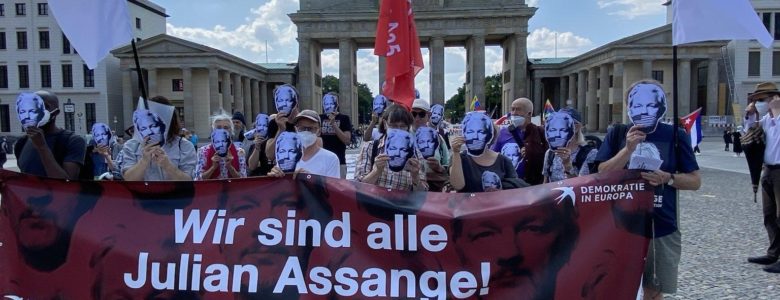
DiEM25 local groups took to the streets on July 3 to demand Assange’s freedom
For almost 10 years now, Julian Assange has been atoning with his freedom for his deeds as a journalist.
On July 3 DiEMers around Europe celebrated his 50th birthday with a coordinated protest action.
The latest revelations in the case of Julian Assange about fabricated evidence show once again that his prosecution is a massive attack on our freedom. To break the media silence and show our support, we took to the streets of Europe to demand his freedom.
It is crucial to counter the character assasination that the establishment has launched against him and show our support to help turn around the general conception of him as a person.
To ask the public: “Why are you so afraid of Assange?” To talk to people on the streets and let them know that Julian Assange is suffering in the middle of Europe in a prison cell for revealing war crimes. To gain their support for our Advisory Panel member!
For this every small action counts. We have been part of bigger protests as well as doing our own small actions. In some cities there were only three of us, but we were part of a worldwide growing protest. And we are proud of what we have achieved so far. Check out the collection of pictures from different places on our DiEM Voice gallery.
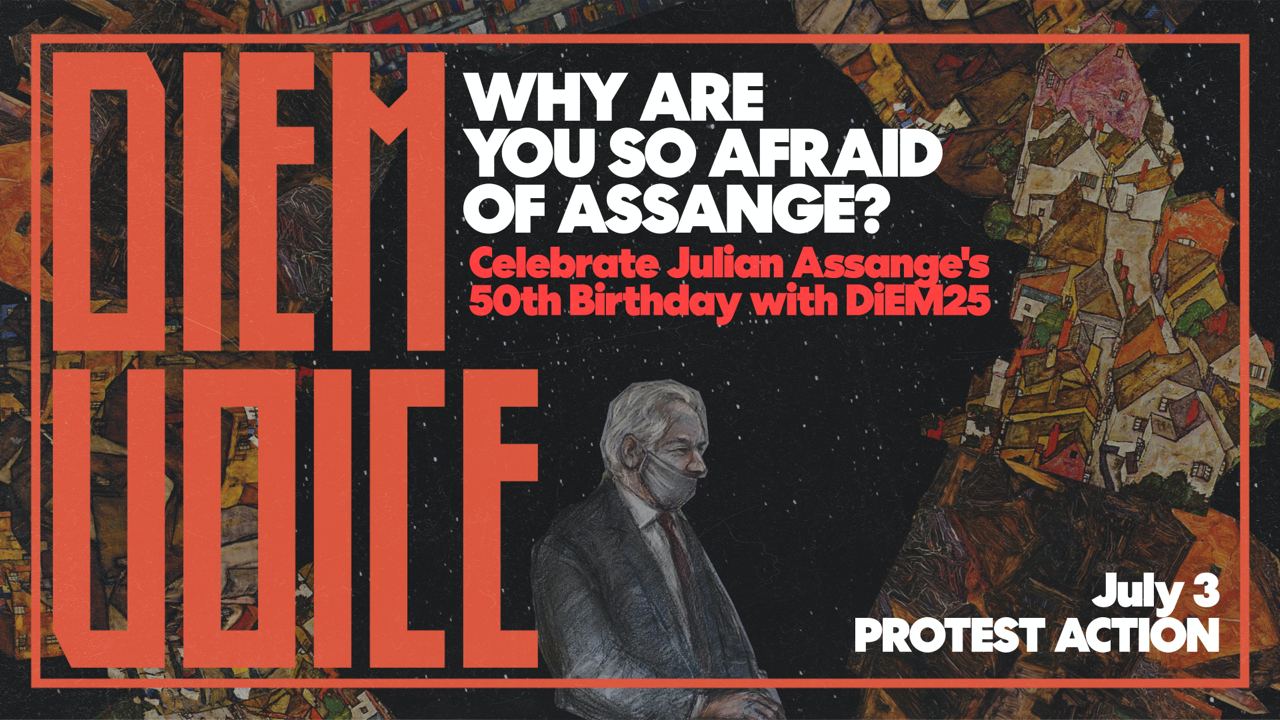
We went to bring the DiEM Voice exhibition about the Julian Assange case into life and onto the streets in Europe. With our masks we showed that they are trying to silence Julian and the free press. We invited the media and made some headlines, like in the local news in Berlin, Germany.
Our action was complemented by a DiEM Voice TV episode on July 5. Watch it here and most importantly, Join DiEM25 to protect press freedom and safe democracy!
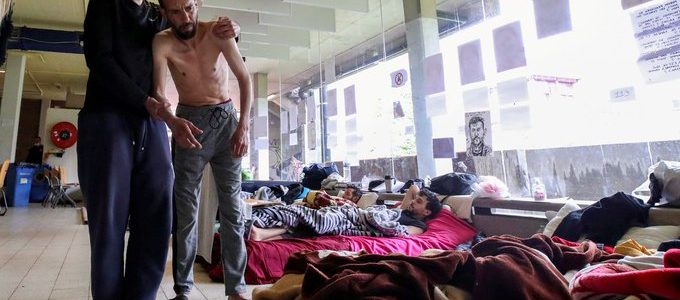
‘Dying to be regularised’: 100+ artists and thinkers sign open letter in support of Brussels’ hunger strikers
More than 100 artists and prominent personalities have co-signed an open letter in support of the Brussels hunger-strikers, including DiEM25 co-founder and MeRA25 leader Yanis Varoufakis and several members of DiEM25’s Advisory Panel.
Farida is 51. She was born in Belgium. Her whole family has the Belgian nationality. Farida has a steady job. She cleans offices and public buildings, for 6 to 8€ an hour. Her last application for regularisation of her administrative status got rejected and she is now subjected to a formal order to leave the territory, issued by the state.
Kiran fled a civil war in Nepal and filed an asylum claim in Belgium, 16 years ago. While his asylum request was still pending, he got a job. He was then paid 10€ an hour. When his asylum claim got rejected, his wage fell to 2,5€ an hour. His daughter, born in Belgium, is now 5 years old and speaks fluent Flemish that she learned at school. The family introduced five applications to be regularised, they were all rejected.
Mohamed has been living in Belgium for 17 years. He treasures an old picture of the inauguration of the new Brussels’ metro. “I worked on public construction sites. […] We dug the metro tunnels linking the four lines. It was tough. What I recall most vividly, is that we were always gasping for oxygen.” Mohamed worked for a shady subcontractor “without any insurance or protection”. He adds “if we got lucky, they would pay us 3€ an hour.”
Farida, Kiran and Mohamed are part of a political collective made of 475 undocumented migrants. For the last 50 days, they have occupied and conducted a hunger strike in three sites in Brussels (two universities and a church). Having first engaged into more traditional forms of political actions (lobbying, demonstrations, occupations, etc.) and pushed to the edge by the consequences of the Covid-19 pandemic, they decided to turn to a political action of last resort: they rendered visible on their own flesh the violence to which they are subjected on a daily basis. Reduced by their economic exploitation to the status of pure bodies, they turned their organisms into the site of the struggle for their legal recognition. According to the physicians who look after them, their hunger strike entered the “critical” phase two weeks ago. Their bodies, having burned all of sugar and fat, start to consume its own organs, including the heart. Death becomes then a real and imminent threat.
Simple demands
The undocumented migrants’ demands are simple. First, they want the hunger strikers to be regularised. Second, they want the definition of clear and permanent criteria of regularisation, that would be applied by an independent commission, to be put on the government’s political agenda.
The current state secretary for asylum and migration, the christian-democrat Sammy Mahdi, is refusing to open any negotiation on this basis. He’s resorting to a hefty argument to justify his rigid stance: the undocumented migrants have received an order to leave the territory, issued by the state, to which they did not comply. They are therefore individually responsible for their administrative situation.
Is this juridical formalism enough to justify denying the undocumented migrants any legal status? It conveniently sweeps under the carpet the fact that Belgium (and more broadly the European Union) often produces the migrants’ irregular situation. There are 150,000 persons in Belgium living and working in Belgium without papers. According to a study produced by the Pew Center, around 3.9 to 4.8 millions persons are undocumented migrants within the EU.
This massive number is the result of a deliberate shift in the design of migration policies. Over the last 20 years, European states have collectively and drastically reduced the legal migration pathways to Europe. They promoted restrictive and arbitrary practices within their public administration, toughening for instance the conditions to renew temporary residence permits – which pushed many migrants into an irregular status. They externalised the sensitive task of controlling the European external borders, delegating this responsibility to neighbouring states (such as Turkey and Libya) whose records with regards to migrants’ welfare is poor, to say the least. They also allowed their labour markets to become segmented between the workers with and without papers, which further fuels social dumping into economic sectors that cannot be outsourced (construction, food and hospitality, care, etc.) while facilitating the exploitation of an insecure workforce.
This juridical formalism also overlooks the peculiar history of Belgium’s migration policies. Over the last decades, roughly every ten years, Belgium grows aware that there are many undocumented migrants living on its territory and that this situation is unsustainable in the long term. Belgium then proceeds to large-scale but temporary regularisation campaigns (in 1999-2000 and then in 2009-2011), swearing each time that this is would be the last. By contrast, France and Spain have long concluded that this erratic management of migration led to a political dead-end. They opted to set up some clear and permanent criteria (such as the length of the stay, a stable job, proven social ties, etc.) in virtue of which undocumented migrants can be regularised on a continuous and individual basis.
Fear of the far-right
The Belgian government – as many other governments across Europe – is committing a grave political mistake. It is petrified by the rise of right-wing nationalist parties. It is attempting to demarcate itself from this political offer (while nevertheless appealing to its electorate) by implementing migration policies that are “firm but humane”. But pragmatically it means that the Belgian government is currently implementing a watered-down version of the migration platform promoted by nationalist parties while claiming to hold in high esteem the human rights and the norms of international law.
Such an approach amounts to a double failure. For, it implies that xenophobic parties have the right political answers to migration while tainting the universal values it refers itself to. To fight back against the far-right, one does not co-opt its political agenda. To fight back against the far-right, one contests its ideas, be it through its rhetoric or its actions.
For all the reasons above, we urge the Belgian government to resume as soon as possible the dialogue with the hunger strikers in the perspective of their regularisation and to launch political reform setting up some clear and permanent criteria of regularisation for the future.
This letter is co-signed by:
Ken Loach [DiEM25 Advisory Panel member]; Dardenne Brothers ; Noam Chomsky [DiEM25 Advisory Panel member] ; Roger Waters ; Christiane Taubira ; Agnès Jaoui ; Agnès B ; Brian Eno [DiEM25 Advisory Panel member] ; Costa Gavras ; Michele Ray Gavras ; Saule ; Susan George ; Dominique Gros ; Radu Mihaileanu ; Cédric Herrou ; Dominique Blanc ; Judith Butler ; Irène Jacob ; Marianne Denicourt ; André Wilms ; Yanis Varoufakis [DiEM25 co-founder and MeRA25 leader] ; Jean Ziegler ; Ai Wei Wei ; Peter Gabriel ; Bouli Lanners ; Virginie Ledoyen ; Natacha Regnier ; Liam Cunningham ; Jeanne Balibar ; Marius Gilbert ; Emmanuel André ; Robert Guediguian ; Françoise Tulkens ; Annemie Schaus ; Aki Kaurismaki ; Mike Leigh ; Etienne Balibar ; Philippe Geluck ; Achille Mbembé ;
Photo (c): Reuters
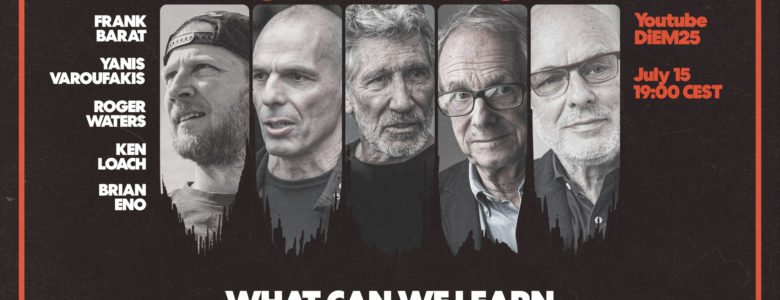
What can we learn from the beautiful game? Featuring Yanis Varoufakis, Roger Waters, Brian Eno and Ken Loach
‘What can we learn from the beautiful game?’
That’s the question Ken Loach, Yanis Varoufakis, Brian Eno, Roger Waters and Frank Barat will try to answer when they talk again on Thursday from 7PM CEST / 6PM BST.
Click above for livestream
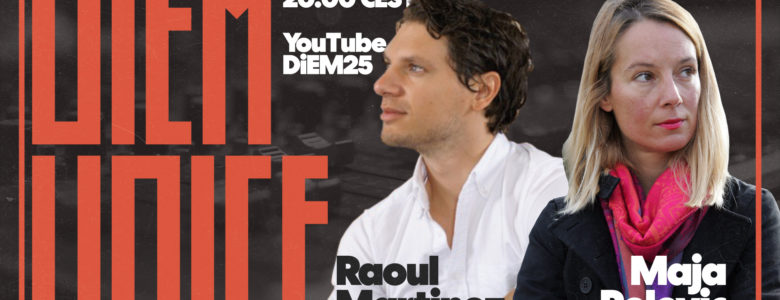
Live tonight on DiEM TV: “Can we create freedom?” with Maja Pelević and special guest Raoul Martinez — 8PM CEST
In this exclusive episode of DiEM Voice TV, Raoul and Maja will talk about power, control, our identities and whether it is possible to make radical changes in our society even if we can’t control the forces that shape us.
They will also discuss the limits of our freedom and how we can we transcend them. Click above to watch!
About DiEM TV
Switch on the television from the future! We call it TV because we like retro-futurism. But it’s much more than TV. In times of global pandemics, DiEM TV is special online and completely free series to understand the current crisis and offer tools and hope to get out of it stronger and more united in building the World After Coronavirus.

Techno-Feudalism is taking over
This is how capitalism ends: not with a revolutionary bang, but with an evolutionary whimper. Just as it displaced feudalism gradually, surreptitiously, until one day the bulk of human relations were market-based and feudalism was swept away, so capitalism today is being toppled by a new economic mode: techno-feudalism.
This is a large claim that comes on the heels of many premature forecasts of capitalism’s demise, especially from the left. But this time it may well be true.
The clues have been visible for a while. Bond and share prices, which should be moving in sharply opposite directions, have been skyrocketing in unison, occasionally falling but always in lockstep. Similarly, the cost of capital (the return demanded to own a security) should be falling with volatility; instead, it has been rising as future returns become more uncertain.
Perhaps the clearest sign that something serious is afoot appeared on August 12 last year. On that day, we learned that, in the first seven months of 2020, the United Kingdom’s national income had tanked by over 20%, well above even the direst predictions. A few minutes later, the London Stock Exchange jumped by more than 2%. Nothing comparable had ever occurred. Finance had become fully decoupled from the real economy.
But do these unprecedented developments really mean that we no longer live under capitalism? After all, capitalism has undergone fundamental transformations before. Should we not simply prepare ourselves for its latest incarnation? No, I do not think so. What we are experiencing is not merely another metamorphosis of capitalism. It is something more profound and worrisome.
Yes, capitalism has undergone extreme makeovers at least twice since the late nineteenth century. Its first major transformation, from its competitive guise to oligopoly, occurred with the second industrial revolution, when electromagnetism ushered in the large networked corporations and the megabanks necessary to finance them. Ford, Edison, and Krupp replaced Adam Smith’s baker, brewer, and butcher as history’s prime movers. The ensuing boisterous cycle of mega-debts and mega-returns eventually led to the crash of 1929, the New Deal, and, after World War II, the Bretton Woods system – which, with all its constraints on finance, provided a rare period of stability.
The end of Bretton Woods in 1971 unleashed capitalism’s second transformation. As America’s growing trade deficit became the world’s provider of aggregate demand – sucking in the net exports of Germany, Japan, and, later, China – the US powered capitalism’s most energetic globalization phase, with a steady flow of German, Japanese, and, later, Chinese profits back into Wall Street financing it all.
To play their role, however, Wall Street functionaries demanded emancipation from all of the New Deal and Bretton Woods constraints. With deregulation, oligopolistic capitalism morphed into financialized capitalism. Just as Ford, Edison, and Krupp had replaced Smith’s baker, brewer, and butcher, capitalism’s new protagonists were Goldman Sachs, JP Morgan, and Lehman Brothers.
While these radical transformations had momentous repercussions (the Great Depression, WWII, the Great Recession, and the post-2009 Long Stagnation), they did not alter capitalism’s main feature: a system driven by private profit and rents extracted through some market.
Yes, the transition from Smithian to oligopoly capitalism boosted profits inordinately and allowed conglomerates to use their massive market power (that is, their newfound freedom from competition) to extract large rents from consumers. Yes, Wall Street extracted rents from society by market-based forms of daylight robbery. Nevertheless, both oligopoly and financialized capitalism were driven by private profits boosted by rents extracted through some market – one cornered by, say, General Electric or Coca-Cola, or conjured up by Goldman Sachs.
Then, after 2008, everything changed. Ever since the G7’s central banks coalesced in April 2009 to use their money printing capacity to re-float global finance, a deep discontinuity emerged. Today, the global economy is powered by the constant generation of central bank money, not by private profit. Meanwhile, value extraction has increasingly shifted away from markets and onto digital platforms, like Facebook and Amazon, which no longer operate like oligopolistic firms, but rather like private fiefdoms or estates.
That central banks’ balance sheets, not profits, power the economic system explains what happened on August 12, 2020. Upon hearing the grim news, financiers thought: “Great! The Bank of England, panicking, will print even more pounds and channel them to us. Time to buy shares!” All over the West, central banks print money that financiers lend to corporations, which then use it to buy back their shares (whose prices have decoupled from profits). Meanwhile, digital platforms have replaced markets as the locus of private wealth extraction. For the first time in history, almost everyone produces for free the capital stock of large corporations. That is what it means to upload stuff on Facebook or move around while linked to Google Maps.
It is not, of course, that traditional capitalist sectors have disappeared. In the early nineteenth century, many feudal relations remained intact, but capitalist relations had begun to dominate. Today, capitalist relations remain intact, but techno-feudalist relations have begun to overtake them.
If I am right, every stimulus program is bound to be at once too large and too small. No interest rate will ever be consistent with full employment without precipitating sequential corporate bankruptcies. And class-based politics in which parties favoring capital compete against parties closer to labor is finished.
But while capitalism may end with a whimper, the bang may soon follow. If those on the receiving end of techno-feudal exploitation and mind-numbing inequality find a collective voice, it is bound to be very loud.
This article was originally published by Project Syndicate.
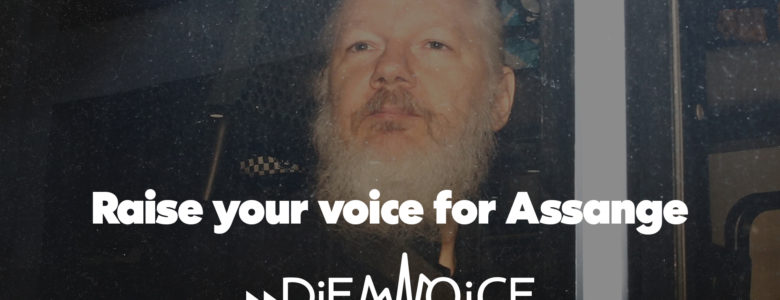
Open Letter to Joe Biden by 95 Greek MPs: “Drop all charges against Julian Assange!”
As part of the international mobilisation to apply pressure on the US government to end the persecution of Julian Assange, MeRA25 invited members of Greece’s Parliament to co-sign the letter below, addressed to President Biden.
The letter reminds the US President that, as Obama’s Vice-President, he took the decision not to prosecute Julian. Indeed, the prosecution – and request to the UK authorities that he be extradited to the US – went ahead under President Trump.
The letter also reminds Mr Biden that Julian is fading daily in solitary confinement because his Department of Justice chose to appeal a British court’s verdict not to extradite him to the US – and, thus, calls upon him to drop all charges and rescind Julian’s persecution.
Similar letters have been sent to the US President by British and Australian MPs, including some representing the two countries’ conservative parties. In this spirit, MeRA25 invited MPs from all wings of Greece’s Parliament to join its 9 MPs as co-signatories – an invitation that SYRIZA MPs accepted. [Nb. Conservative New Democracy and the former PASOK party did not reply, while the Communist Party of Greece refused the request.]
The significance of freeing Julian and ending his persecution cannot be overstated. By subjecting him to a slow death, the powers behind his incarceration are targeting the right of Europeans and Americans to know about the crimes perpetrated in their name and behind their back by their governments, with the help of corporates.
The struggle to free Julian is also a struggle to prevent the dying of the last hope that barbarism can be resisted.
Letter to President Biden
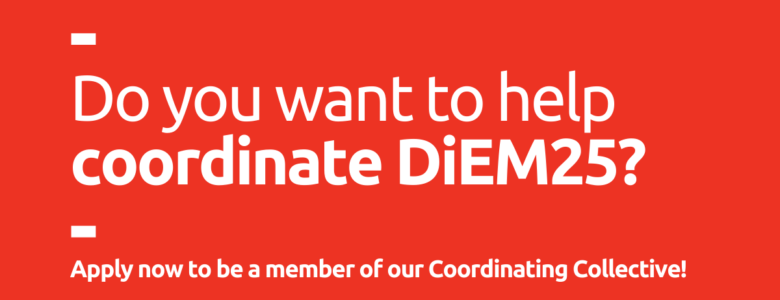
Would you like to help coordinate our movement? Candidacies are now open!
Six posts in DiEM25’s Coordinating Collective are up for election and you can play a role coordinating our movement across Europe.
The time has come. We are again renewing half of our Coordinating Collective (CC), and all DiEM25 members are welcome to be candidates.
CC members coordinate our movement to ensure it remains a relevant and powerful force in the fight for people-power in Europe. Their responsibilities range from managing volunteer teams, planning and maintaining processes and deadlines, and developing and running strategies, policy-formation and political campaigns, to acting as political representatives of our common project.
DiEM25 is a feminist movement promoting gender balance in all its bodies, including the CC. At least 50% of CC members will be women. We also encourage people from all parts of Europe and beyond (given that almost all meetings are virtual), and from all walks of life to apply.
Do you have the time, experience and skill-set to coordinate our movement? Check out the requirements and the timeline here. You can submit your candidacy on the same page.
Timeline for the 2021 CC elections.
July 5: Call for CC candidacies
July 16: Page goes up, candidates can start to collect signatures, objections to candidacies can be filed, more people can still submit their candidacies
Aug 4: Final date to submit your candidacy
Aug 10: Final date to collect signatures (every candidate needs 20 signatures)
Aug 13: Voting starts
Aug 28: Last day to vote
Aug 29: Results are announced
DiEM25 members considering running for a CC position should take the following under consideration.
What are the requirements?
- The language in which CC meets, discusses and deliberates is English. Full fluency in English is therefore vital.
- CC members work hard and, due to DiEM25’s present financial situation, for no monetary reward. Candidates therefore need to be prepared to dedicate a minimum of four hours per day to DiEM25-related work, mainly hands-on organising.
- CC members, like all DiEMers, must identify with the manifesto and be ready to uphold our Organising Principles.
- CC members must be very familiar with DiEM25’s policies and stances, in order to be able to represent them in the media, in talks with partners or at conferences.
- CC members participate in at least one teleconference per week and must often travel to events on behalf of DiEM25 or to physical CC meetings. Travel is reimbursed.
- If you are an active politician with an elected mandate, you cannot be a candidate or member of the CC unless the VC gives you an exemption. If you are a member of a political party, you must declare it in your application. Also if you become a member of a party while in the CC, you must inform the CC immediately. Non-disclosure of political party affiliation are grounds for disqualification/dismissal.
- The cut-off date to qualify as a candidate is 1st June 2021. Any members who joined after that date must wait for another round of elections.
- Candidates must fill out the application form completely. Incomplete applications, e.g. those lacking a video, will not be listed on the ballot.
- Each candidacy can be only one person, not a team.
How do I submit my candidacy?
You can submit your candidacies until August 4. In order to qualify as a candidate, you must have been a member since at least June 1, 2021. Any members who joined after that date must wait for another round of elections.
DiEM25 particularly welcomes candidacies by people who have strong planning, organising and fundraising skills, people who live in countries not currently represented on the CC, or women and minorities.
Prospective candidates must provide the following as part of their application: a short statement, a description of their work for DiEM25, a description of their experience with hands-on coordinating work outside of DiEM25, a CV, a video message in English to fellow DiEM25 voters, and a scanned copy of an official ID or passport.
For more information on how to submit your candidacy, click here.
Interview with the CC.
After submitting your candidacy, the electoral commission will be in touch in order to do an interview, which is also an opportunity for you to ask questions about the Coordinating Collective.
Submit your candidacy.
We hope to see your application!